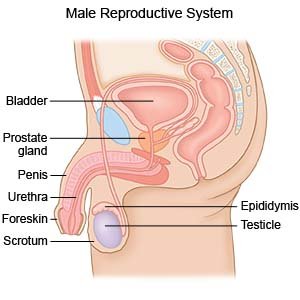Cryosurgery for Prostate Cancer
Medically reviewed by Drugs.com. Last updated on Sep 23, 2025.
What do I need to know about cryosurgery?
Cryosurgery, also called cryotherapy or cryoablation, is surgery to treat prostate cancer by freezing the prostate cancer cells. The prostate is a male sex gland that helps make semen.
 |
How do I prepare for cryosurgery?
Your healthcare provider will talk to you about how to prepare for surgery. You may be told not to eat or drink anything after midnight on the day of your surgery. Your provider will tell you which medicines to take or not take on the day of your surgery.
Related medications
What will happen during cryosurgery?
- You may be given general anesthesia to keep you asleep and free from pain during surgery. You may instead be given local anesthesia to numb the area. You will be awake with local anesthesia, but you will not feel pain. A warming catheter will be placed in your urethra. This will help protect the urethra and rectum from the cold temperature. Your healthcare provider will put an ultrasound probe into your rectum to guide the insertion of the cryoprobes (probes or needles).
- Small incisions may be made in your perineum if large cryoprobes will be used. The perineum is the area between your penis and anus. Six to 30 cryoprobes will be placed into the prostate through your perineum. These cryoprobes are connected to a machine that allows your provider to control the temperature. Sensors will also be placed to monitor the temperature of the prostate and the structures around it. A cryogen (freezing liquid chemical) will be passed into the cryoprobes until it fills the prostate.
- When the cryogen is inside the prostate, your provider may set the temperature to the freezing point or lower. This forms small ice balls that freeze the cancer cells. Your provider will then allow the ice to thaw by replacing the liquid with helium. Your provider may repeat the freezing and thawing process to make sure all the cancer cells are killed. When the last thawing is completed, a catheter will be put into your bladder to help drain your urine. The cryoprobes will be removed and any incisions that were made will be closed and covered with bandages.
What should I expect after cryosurgery?
The catheter placed during surgery to drain urine will stay in place for up to 3 weeks after surgery. You should expect to have some bruising and feel sore where the probes went into your body. This is normal and should not last long. You may be allowed to go home the same day as your procedure, or you may need to stay in the hospital.
What are the risks of cryosurgery?
- Problems may happen during your cryosurgery and your healthcare provider may need to make a larger incision. The cold temperature may cause irritation or damage in and around the prostate. Your prostate or other parts of the urinary tract may get injured during surgery. Blood flow or nerves may be affected and cause you to have more problems urinating or having an erection. You may also have swelling, pelvic pain, or a numb feeling down your legs. Even after cryosurgery, all of the cancer cells may not be killed, or the tumor may come back. You may need to have more cryosurgeries or other procedures.
- You may get a blood clot in your leg or arm. The clot may travel to your heart or brain and cause life-threatening problems, such as a heart attack or stroke.
Care Agreement
You have the right to help plan your care. Learn about your health condition and how it may be treated. Discuss treatment options with your healthcare providers to decide what care you want to receive. You always have the right to refuse treatment. The above information is an educational aid only. It is not intended as medical advice for individual conditions or treatments. Talk to your doctor, nurse or pharmacist before following any medical regimen to see if it is safe and effective for you.© Copyright Merative 2025 Information is for End User's use only and may not be sold, redistributed or otherwise used for commercial purposes.
Further information
Always consult your healthcare provider to ensure the information displayed on this page applies to your personal circumstances.
